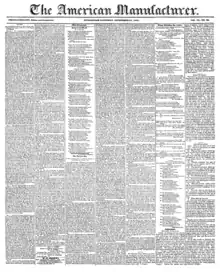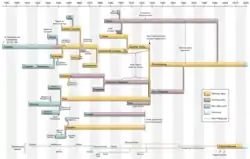The American Manufacturer
The American Manufacturer was a newspaper published in Pittsburgh, Pennsylvania, United States, on a mostly weekly basis from 1830 until 1842. The paper supported Jacksonian Democratic politics and was known for its radical and provocative content.[2] Its successor by merger was the Pittsburgh Post, which by further consolidation became the Pittsburgh Post-Gazette.
 Front page, 18 September 1841 | |
| Type | Weekly newspaper (1830–1842); daily newspaper (1837–1838) |
|---|---|
| Founder(s) | William B. Conway |
| Founded | 6 March 1830[1] |
| Political alignment | Democratic |
| Language | English |
| Ceased publication | 3 September 1842[1] |
| City | Pittsburgh, Pennsylvania |
| Country | United States |
| |
Inception
In February, 1830, William B. Conway issued a prospectus for a new weekly newspaper to be called The American Manufacturer. He announced that the first issue would appear on March 6 of the same year, and set the subscription price at $2 per annum.[3] Conway promised that "American Manufactures, Agriculture, and Internal Improvement, will find in him an unwavering advocate."[4]
Conway and R. Phillips years
Upon founding the Manufacturer, or at least not long thereafter, Conway associated himself with Richard Phillips in the conduct of the paper.[5][6]
From the start, the paper took radical grounds in favor of political, social and religious reforms. It supported the ideas of Frances Wright, and offended the pious with its skepticism toward religious authority and practices.[3] Conway's inflammatory views gained him among his enemies the nickname "the vile and speckled reptile."[7]
By March 1833, Conway retired from the editorial chair and left Phillips, the junior editor, in sole charge.[8]
Phillips continued the paper's religious irreverence. In June 1833, impugning the efficacy of religion as a means of warding off cholera, he editorialized: "Religious devotion, we say, is particularly ridiculous, and not more ridiculous than injurious." Concerning those who attended church on special fast days to pray against the disease, he said that they might be divided into two classes, "the cunning but servile sycophant of popularity, and the simple dupes who swallow all, for orthodoxy, which their preachers and leaders tell them."[3][9] The paper invoked wrath from churches and rival newspapers by calling for the public celebration of the birthday of Thomas Paine.[3] The editor of the Allegheny Democrat, regarding Paine as an "infidel," wrote, "It is to be hoped for the credit of our city that but few will participate in this abominable festival."[10][11]
McDonald and T. Phillips years
In late 1836, Richard Phillips, around the time he moved west,[5] disposed of the Manufacturer to his brother[12] Thomas Phillips, and Zantzinger McDonald.[13] The newcomers proposed to launch a daily edition of the paper,[14] which began issuing in April 1837 under the name Daily Commercial Bulletin and American Manufacturer.[15] Its nameplate displayed the first half of the title in considerably larger type than the latter half. The hostile Pittsburgh Gazette scoffed, "In the inside, too, the name Daily Commercial Bulletin appears conspicuously, while its former odious name shuns the light of day and shrinks from the gaze of a long-insulted people."[16]
McDonald and Phillips early on embroiled themselves with rival newspapermen. In one instance, McDonald took an editorial battle from the printed page to the office of the Allegheny Democrat, where he threatened that paper's editor with a large horse pistol.[17] On another occasion, McDonald and Phillips were sued for libel by Neville B. Craig of the Gazette for publishing an item by James Callan defaming Craig's character as a parent. The case would be settled a couple of years later with Phillips (McDonald having died by then) paying the necessary costs and issuing a letter of apology.[18][19]
The life of the Bulletin came to an early end in January 1838, and the American Manufacturer carried on as a weekly-only publication. The Gazette gave a harsh obituary: "It seems we are to have no more lying Bulletins. That excrescence from the Manufacturer office gave the last sign of vegetation this morning. Its poisonous exhalations have ceased, and hereafter, instead of its daily deadly effusions, we are to have only weekly issues from that corrupt, and corrupting source."[16][20]
McDonald's tenure with the paper must have been a short one, as he died in July 1838 at the age of 25.[21] Thomas Phillips ended up as sole publisher.[1]

Consolidation
In September 1842, Thomas Phillips agreed to consolidate the Manufacturer with another Democratic weekly, the Mercury and Democrat,[22] which was itself a recent merger of the Pittsburgh Mercury and the Weekly Pittsburgher and Allegheny Democrat.[23] The final issue of the Manufacturer announced that the combined establishment would issue a new Democratic daily paper, the Daily Morning Post, and a less frequent edition with the same essential content called the Weekly Mercury and Manufacturer.[24] The weekly edition kept the names of its predecessors until 1848, when it was rebranded as the Saturday Morning Post.[25]
The daily Post, originally co-published by Phillips, met with success after other local attempts at Democratic dailies, including that of the Manufacturer in 1837–1838, had failed in short order. After nearly 85 years of publication, the Post united with the Gazette Times (descended from the Manufacturer's old nemesis, the Gazette) to form the Post-Gazette.[26]
Notes
- "About The American Manufacturer". Chronicling America. Library of Congress. Retrieved 9 May 2014.
- Glasco, Laurence A. (2004). The WPA History of the Negro in Pittsburgh. University of Pittsburgh Press. p. 157. ISBN 0-8229-4232-1.
- Wilson 1898, p. 842.
- Conway, William B. (26 February 1830). "Prospectus". The Pittsburgh Gazette. p. 3, col. 5.
- Crosby, Nathan (1858). "Phillips, Capt. Richard". Annual obituary notices of eminent persons who have died in the United States. For 1857. Boston, MA: Phillips, Sampson and Company. p. 274.
- The American advertising directory, for manufacturers and dealers in American goods : for the year 1831. New York: Jocelyn, Darling & Co. 1831. p. 112.
- Wilson 1898, p. 846.
- "[untitled]". Pennsylvania Inquirer and Morning Journal. Philadelphia. 14 March 1833. p. 2, col. 1.
William B. Conway, Esq., has retired from the editorial chair of the Pittsburg Manufacturer. The junior editor, Richard Phillips, Esq. will hereafter have the sole management of the paper.
- "To the Editor of the Pittsburgh Gazette". The Pittsburgh Gazette. 5 July 1833. p. 3, col. 2.
- "[untitled]". The Daily Pittsburgh Gazette. 28 January 1834. p. 2, col. 1.
- Wilson 1898, p. 844.
- "Caution". The Daily Pittsburgh Gazette. 25 September 1838. p. 2, col. 3.
- "[untitled]". The Boston Morning Post. Boston, MA. 24 December 1836. p. 2, col. 2.
- M'Donald, Zantzinger; Phillips, Thomas (28 December 1836). "Prospectus". The Pittsburgh Mercury. p. 1, col. 6.
- "New Daily Paper in Pittsburg". Public Ledger. Philadelphia. 17 April 1837. p. 4, col. 1.
- Wilson 1898, p. 845.
- Wilson 1898, pp. 846–847.
- Andrews 1936, p. 76.
- "Our own affair". The Daily Pittsburgh Gazette. 8 May 1839. p. 2, cols. 2–3.
- "[untitled]". The Daily Pittsburgh Gazette. 12 January 1838. p. 2, col. 1.
- The Twentieth Century Bench and Bar of Pennsylvania. 2. Chicago: H.C. Cooper, Jr., Bro. & Co. 1903. p. 836.
- Andrews 1936, p. 292.
- "About The Pittsburgh Mercury and Allegheny democrat". Chronicling America. Library of Congress. Retrieved 9 May 2014.
- "Mercury and Manufacturer". The American Manufacturer. Pittsburgh. 3 September 1842. p. 3, col. 1.
"Daily Morning Post". The American Manufacturer. Pittsburgh. 3 September 1842. p. 3, col. 1. - "About The Saturday morning post". Chronicling America. Library of Congress. Retrieved 9 May 2014.
- Andrews 1936, pp. 291–292.
References
- Andrews, J. Cutler (1936). Pittsburgh's Post-Gazette: "The first newspaper west of the Alleghenies". Boston: Chapman & Grimes. hdl:2027/mdp.39015011226290.CS1 maint: ref=harv (link)
- Wilson, Erasmus, ed. (1898). Standard History of Pittsburg, Pennsylvania. Chicago: H.R. Cornell & Co. p. 842.CS1 maint: ref=harv (link)